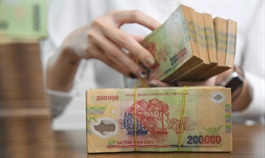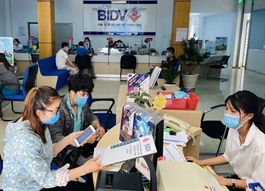Finance experts advise against zero deposit interest rate
Finance experts advise against zero deposit interest rate
The Vietnam Association of Financial Investors (VAFI) has proposed that the Vietnamese dong deposit interest rate be lowered gradually to zero percent per year, but financial experts are seeing this proposal as going against all basic financial rules.
Illustrative photo.
|
Inappropriate measure
I do believe that VAFI shows a spirit of goodwill in requesting the Government to take possible action to lower interest rate as a way to provide support for businesses. However, such a proposal is inappropriate for the financial business environment in Vietnam.
First, risks for depositors should be lowered to zero before deposit interest rate can go down to zero percent per year. Only Government bonds (GB) are risk-free while all the other economic sections have higher risk rates. It should be noted that the Government still pays interest on GBs, even though they are risk-free. It would be a paradox if other economic sections with higher risks are allowed to provide no interest for their clients.
For foreign investors, Vietnam’s credit rating is of non-investment grade. Therefore, when they invest in financial products in Vietnam, they expect an appropriate interest rate to make up for the risks they could suffer when they buy financial products in Vietnam, including GBs and securities of Vietnamese companies issued domestically or globally. Investors would not accept if the Vietnam dong deposit interest rate goes down to zero percent per year, while banks still do not have a better risk rate than the Government.
Second, inflation should also be taken into consideration. Generally, the banks pay clients’ interest of about 2% higher than inflation rate. If the inflation rate in Vietnam at the moment is 3.5%, for instance, the Vietnam dong deposit interest rate should be equal to 3.5%, plus 2%, making the Vietnam dong deposit interest rate to 5% to 6% per year. If the inflation rate is 3.5%, but deposit has zero interest, it would mean depositors suffer a negative 3.5% interest rate. This has never happened, and perhaps will never happen in Vietnam for at least another ten years.
Third, by comparison to other Southeast Asian countries like Laos, Cambodia and Myanmar, who have credit ratings similar to Vietnam, some other countries like Singapore, Malaysia, Thailand, Indonesia and the Philippines have higher credit ratings than Vietnam. Therefore, these countries can pay low interest, but they cannot have zero percent interest rate per year. For this reason, Vietnam cannot do anything better than these countries and allow for zero annual interest rate for Vietnamese dong deposits.
Fourth, in addition to the traditional investment channels like finance, securities, real properties, gold, bank deposits and foreign currencies, the financial market now provides other investment channels like virtual stock exchange, multilevel and forex trading platforms. At the moment, individuals and investors pour their cash into securities and real properties. If the banks paid zero interest on Vietnam dong deposits, people would withdraw their money and pour more money into these two channels, or into gold, making it likely to create a property bubble.
Economy at risk
VAFI believes that the recent reduction of operating interest rates by the State Bank of Vietnam (SBV) has created a positive effect on cash flow into securities that can provide assistance for both banks and businesses, but I do not really think this is the case. Actually, such cash flows in the securities market goes into the secondary market, rather than the primary market, and also does not make its way into production and business activities either. The VN Index has increased a lot because investors have traded in shares, stocks and securities, which raises their price. The beneficiaries are actually the speculators rather than manufacturers and product traders or issuers.
The Government has been trying to lower interests on loans, in an effort to provide significant support for businesses, but some people have tried to make different use of this beneficial policy. If the Vietnam dong deposit interest rate goes down to zero percent, immense amounts of cash would flow out of banks and into official and unofficial financial markets very soon, creating a property bubble. In such a case, it would increase the risks for the economy. Therefore, VAFI zero deposit interest rate proposal could make the speculators market very busy and active, while businesses and manufacturers might not benefit at all from this zero interest rate policy.
The Law on Credit Institutions (CI) was issued in 2010, with an amendment to it issued in 2017, providing a chapter for special control of CI bankruptcy. At this moment, not a single bank has gone bankrupt, but it is not unlikely that a bank or two will file for bankruptcy in the near future. We now see that the prospects of risks for the banking system are high. No cash banks are those with ineffective performance, and banks with poor business performance are specially controlled. If the Vietnam dong deposit interest rates were lowered to zero percent per year, it would cause chaos in the money market. It would not help the banks, especially the most vulnerable ones, but could actually even lead banks to bankruptcy. These are some major reasons why such a zero interest rate policy would not work in Vietnam.
It should be noted that Vietnam's GDP in 2020 fell to 2.91%, and rose to 4.48% in the first quarter of 2021, but the coming scenario could be rather unpredictable. The Covid-19 pandemic has caused negative effects on all economic sectors from agriculture to tourism, transportation, retail, industrial production and exports. While the economy sees some unsustainable growth now, any hurried step to reduce the Vietnam dong deposit interest rate to zero percent per year could be totally unfeasible and inappropriate for the possible development of the economy at present, and for economic recovery in the future.
























